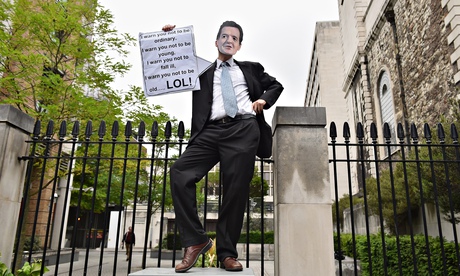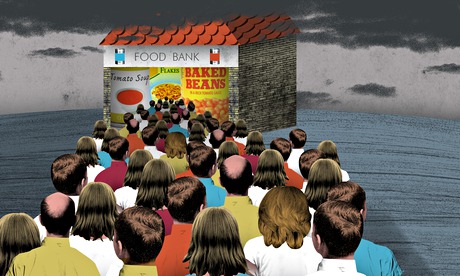The axe fell yesterday, as the cap on what a family can receive in benefits was cut by £3,000 a year in London, double that in the rest of the country. But that’s not the worst of what’s to come. Do cuts summon up “I, Daniel Blake” indignation? No, pollsters find the benefit cap among the most popular of government policies.
One of the great lasting legacies of this Tory era will be Iain Duncan Smith’s vilification of anyone on any benefit, turning hearts to stone. In the early days there was shock at the savagery of serial cuts hitting the same families over and over, children above all. Surely, they couldn’t get away with it? But they did. Less is reported now about the seismic effect of £18bn stripped away.
Victims make little noise, each family isolated with no collective voice. Once influential charities have been intimidated out of anything “political”. Even that unpleasant Victorian distinction between the “deserving” and the “undeserving” poor has gone. Those with disabilities are treated as harshly as the rest, skivers and shirkers all, who in April lose £30 a week in employment support allowance.
Most startling are the rolling cuts to mobility allowances: so far, according to Motability, of 71,000 disabled people reassessed, 31,000 have had their £57.40 weekly allowance stopped. A letter arrives from the Department of Work and Pensions telling them they no longer qualify, and seven weeks later their Motability car is gone, along with a connection to society and often to jobs.
Jason Evans lost a leg in the forces and says a car with room for a wheelchair is vital for him and his young family. When he lost his entitlement a low-loader came and took his car away. He only got it back through an appeal by the British Limbless Ex-Service Men’s Association. “Since the legal aid cuts, others can’t appeal as I did,” he says, from his office at the charity Disabled Motoring UK where he now helps others.
For an example of charity terror, when I called Motability, the company and charity providing these cars, I was surprised to be contacted immediately by the DWP demanding to know what I was writing. Loss of mobility is bad, but far worse is happening to disabled people with the loss of social care: the charity Scope tells me of people issued with incontinence pads in order to ration care visits for taking them to the toilet.
If I listed all the benefit cuts, your eyes would glaze over. People sanctioned for small, unknowing infractions at jobcentres end up in food banks; one in five of the sanctioned end up homeless. Uniquely, the bedroom tax did fire public indignation – evicting people from family homes was highly unpopular. But that didn’t prevent it.
Each cut is spelled out in moral terms: people in social housing should leave their homes to make way for others, and people should have their benefits capped if they have no job. But these moral purposes failed: the Institute for Fiscal Studies found very few families left their homes – they just took the hit, often resorting to food banks in a crisis.
Very few took jobs. Why not? Because nearly 70% of all unemployed people get a job in six months anyway, with another 22% working within a year. The rest have obstacles to work, mainly single mothers with babies. But these facts didn’t get in the way of government images of lazy people with their blinds down.
Universal credit, rolling out to new claimants, is still advertised as offering extra work incentives when the DWP knows that’s not so. Even Duncan Smith now admits the £3bn cuts he accepted to its work allowance seriously diminish it. For every extra pound earned, recipients lose 60p, some losing 90p. Partners, usually women, keep only 35p in every extra pound earned. Built into the system is a delay in paying housing benefit, so most recipients borrow, trapping some in permanent debt. Social landlords report 79% arrears, now that rent is no longer paid directly to them.
If there is good intent in Theresa May’s speeches about “just managing families”, these cuts to her party’s flagship universal credit scheme should be reversed in the chancellor’s autumn statement this month, as some Tory MPs campaign for clemency.
What people most need to know is the overall effect. The Child Poverty Action Group monitoring all research, distils it in Improving Children’s Life Chances. IFS research concludes relative child poverty will rise by 50% by 2020: that means seven poor children in an average class of 30. The worst benefit cuts are invisible, the slow frog-boilers of benefit-freezes as inflation rises. You can argue about poverty, but it means lacking basics such as a spare pair of shoes, a one-week holiday, a birthday party – and enough to eat.
At prime minister’s questions last week, Theresa May snapped back at Jeremy Corbyn: “Many families struggling to make ends meet are paying the benefits of others.” Does she think the strugglers are not also relying on tax credits, or child or housing benefit? The Resolution Foundation points out that the chancellor has choices, despite a gaping black hole in Treasury receipts. If May’s strugglers come first, he could abandon cuts to corporation tax, or the expensive rise in income tax thresholds, where 80% goes to the richest half.
But easing benefit cuts buys Hammond little short-term political credit. The culture of blame and spite has been spread far and wide by government, Tory press and Benefits Street programmes pillorying the poor, the unlucky and the damaged. Duncan Smith’s myths die hard: he blamed drug and alcohol addiction but just 6.6% of claimants are addicts. He blamed divorce – but the working married are poor too. DWP press releases listed “The 10 top worst excuses used by benefit cheats”, omitting official figures showing fraud at just 0.7%.
They called it Labour’s “culture of dependency”, with mythical tales of families who never worked in three generations: Labour left the number out of work for five or more years at just 4,220. Truthiness didn’t start with Donald Trump. But the social damage is deep and lasting: working people on miserable pay need benefits to survive, but are treated as state-dependent despicables.
We shall soon see what Theresa May really intends for her “just managing families”. But does she really know who the strugglers are, how they live and how much they too rely on benefits?
• This article was amended on 15 November 2016 to correct the period of notice given to disabled people who are reassessed as ineligible for the allowance that supports their Motability vehicle: it is seven weeks not three.











